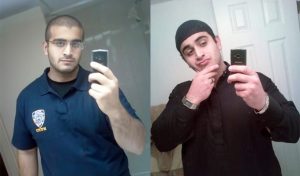A day after a gunman shot dead 50 people at a nightclub in Orlando, police investigated the attacker’s ties to ISIL terrorist group and Americans grieved over the deadliest mass shooting in US history
A day after a gunman shot dead 50 people at a nightclub in Orlando, police investigated the attacker's ties to ISIL terrorist group and Americans grieved over the deadliest mass shooting in US history. Omar Mateen, 29, of Fort Pierce, Florida, carried an assault rifle and a pistol into the packed Pulse club about 2 a.m. Sunday and started shooting.
Omar Mateen, 29, of Fort Pierce, Florida, carried an assault rifle and a pistol into the packed Pulse club about 2 a.m. Sunday and started shooting.
In addition to the people killed, he wounded at least 53 others, police said.
During the attack, Mateen called 911 to pledge allegiance to the ISIL terror group and mentioned the Boston Marathon bombers, according to a US official.
After a standoff of about three hours while people trapped inside the club desperately called and messaged friends and relatives, police crashed into the building with an armored vehicle and stun grenades. They killed Mateen after the rampage.
“It appears he was organized and well-prepared,” Orlando Police Chief John Mina said. Authorities said they haven't found any accomplices.
“We know enough to say this was an act of terror and act of hate,” President Obama said in an address to the nation from the White House.
While the violence could have hit any American community, “This is an especially heartbreaking day for our friends who are lesbian, gay, bisexual or transgender,” he said.
Omar Mir Seddique Mateen was born in 1986 in New York. Most recently he lived in Fort Pierce, about 120 miles southeast of Orlando. Fearing explosives, police evacuated about 200 people from the apartment complex where he lived while they looked through his residence for evidence.
The United States has at various times in recent history provided support to terrorist and paramilitary organizations across the world. It has also provided assistance to numerous authoritarian regimes that have used state terrorism as a tool of repression.
Reports and information proved US involvement in creating and arming the ISIL group only before it began to threaten its home. Analysts say America is using ISIL in three ways: to attack its enemies in the Middle East, to serve as a pretext for US military intervention abroad, and at home to foment a manufactured domestic threat, used to justify the unprecedented expansion of invasive domestic surveillance.